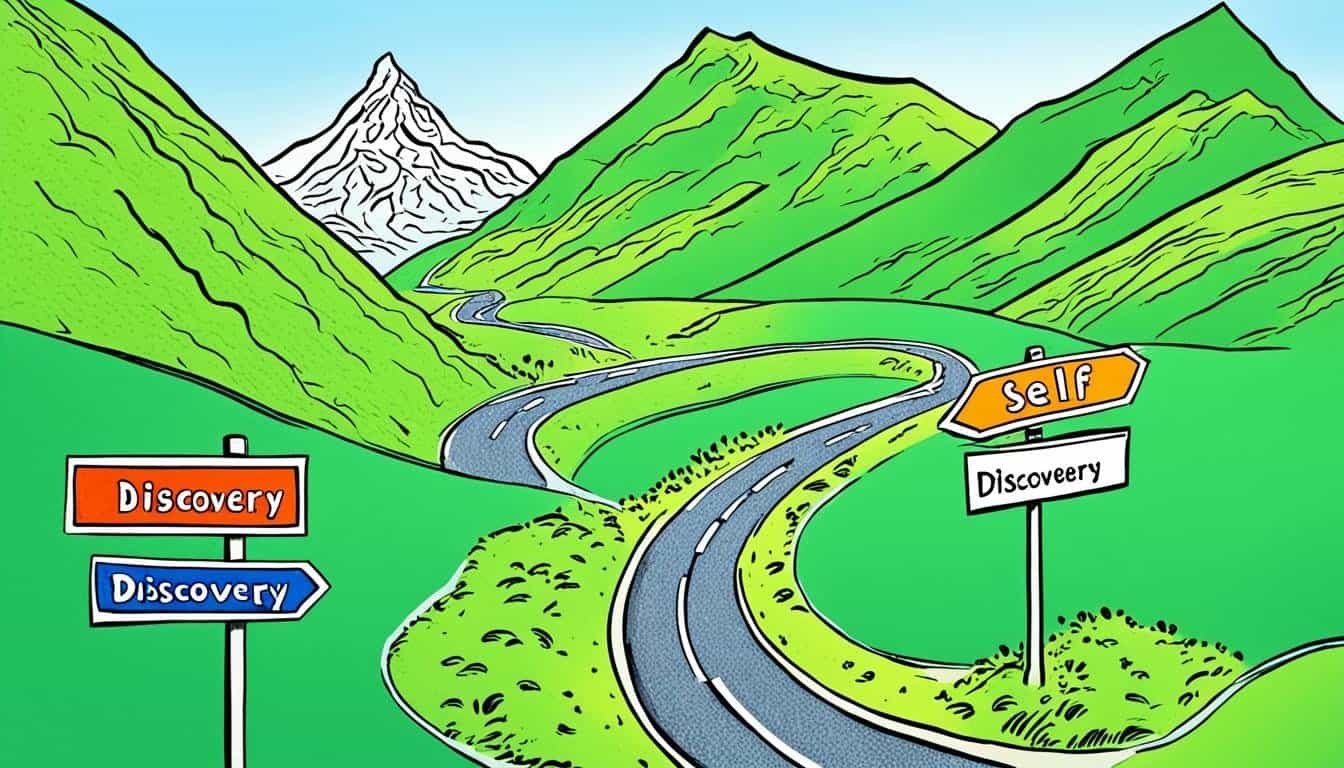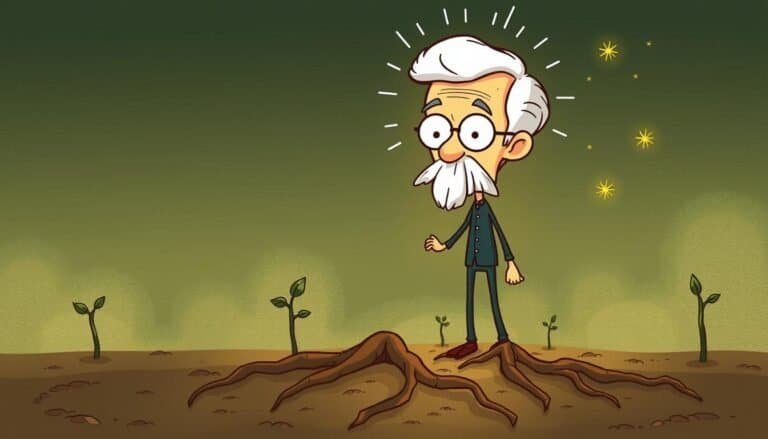Lessons from M. Scott Peck: Key Insights
“The greatest milestone in this journey of life is not the destination, but the transformation that happens along the way.” – M. Scott Peck
Welcome to an exploration of the profound wisdom and life lessons found in the works of M. Scott Peck. As an American psychiatrist and author, Peck has left an indelible mark in the realms of psychology, spirituality, and personal development. His groundbreaking book, “The Road Less Traveled,” serves as a compass for individuals seeking personal growth, self-discovery, and a fulfilling life.
In this article, we will embark on a transformative journey, delving into the key insights Peck offers. From embracing life’s challenges to cultivating discipline, practicing love as an action, and viewing problems as opportunities for growth, we will uncover the invaluable lessons that can shape our lives and guide us on our own unique path of self-development.
Key Takeaways:
- Embrace the challenges of life as opportunities for growth and personal development.
- Cultivate discipline as a fundamental aspect of personal growth and goal achievement.
- Practice love as an action, involving effort and commitment in relationships.
- View problems as valuable learning experiences and catalysts for self-improvement.
- Balance emotional and spiritual health for overall well-being and personal growth.
Life is Difficult, but the First Step Towards Personal Growth
In his renowned book “The Road Less Traveled,” M. Scott Peck starts with a simple yet profound statement: life is difficult. This acknowledgment serves as the foundation for his teachings on personal growth and fulfillment. Peck challenges his readers to accept this truth, emphasizing that it is through embracing life’s challenges that true personal growth can be achieved.
Life is Difficult
Peck asserts that accepting the difficulties of life is the first step towards personal growth. By recognizing the inherent struggles and obstacles we face, we shift our mindset and approach challenges with resilience and determination. Rather than avoiding or denying difficult experiences, we learn to navigate them with a sense of purpose and self-discovery.
Overcoming Challenges
Peck encourages individuals to view challenges not as roadblocks but as opportunities for growth. It is through overcoming these challenges that we develop new skills, gain self-confidence, and expand our capabilities. By embracing difficulties head-on, we set ourselves on a path of personal growth and self-improvement.
Self-Development
Personal growth, according to Peck, requires a willingness to confront and overcome adversity. It is in these moments of struggle that we are pushed to our limits, forcing us to stretch beyond what we thought possible. By stepping out of our comfort zones and taking on challenges, we embark on a journey of self-discovery and self-development.
“The difficulty we face in life is not a barrier to overcome but a path of self-discovery and personal growth.”
The image above captures the essence of overcoming challenges. Just as the climbers in the image push themselves to scale the mountain, we too must face our own challenges in order to reach new heights of personal growth.
In the next section, we will explore another key aspect of personal growth outlined by M. Scott Peck: the role of discipline in achieving personal goals and fulfillment.
Discipline: The Path to Growth and Fulfillment
M. Scott Peck firmly believed in the power of discipline as a catalyst for personal growth and achieving goals. According to him, discipline plays a vital role in all areas of life, including personal relationships, work, and spirituality. By embracing self-discipline and making conscious choices, individuals can overcome obstacles, develop new skills, and reach their fullest potential. The journey of personal growth requires dedication and commitment, and discipline is the guiding force that propels us forward.
Discipline is more than just a strict adherence to rules and routines. It involves the development of habits and behaviors that support our goals and enhance our well-being. By cultivating discipline, we can establish a strong foundation for personal growth and self-improvement. Whether it’s setting specific goals, managing time effectively, or staying focused on our priorities, discipline helps us stay on track and make consistent progress.
One of the key aspects of discipline is the ability to resist temptation and stay committed to our long-term objectives. It requires us to make choices that align with our values and aspirations, even when faced with distractions or short-term gratification. By practicing self-discipline, we strengthen our willpower and develop the resilience needed to overcome challenges along the way.
“Discipline is the bridge between goals and accomplishment.” – Jim Rohn
Discipline is not about perfection or rigidity; it is about creating a structure that supports our growth and provides the framework for achieving our goals. It helps us stay accountable to ourselves and take responsibility for our actions. By embracing discipline, we can shape our habits, transform our mindset, and create positive change in our lives.
Developing Self-Discipline
The process of cultivating self-discipline requires patience, consistency, and perseverance. Here are some strategies to develop and strengthen discipline:
- Set clear and achievable goals: Define your goals and break them down into smaller, manageable steps. This approach allows you to track your progress and stay motivated.
- Create daily routines: Establishing consistent routines and schedules can help you develop self-discipline. By incorporating specific activities into your daily life, you create a sense of structure and discipline.
- Practice delayed gratification: Learn to resist immediate temptations and focus on long-term rewards. Delayed gratification strengthens your self-control and discipline.
- Find accountability partners: Seek support from others who share your goals and values. Having someone to hold you accountable can provide motivation and encouragement.
- Cultivate self-awareness: Understand your strengths, weaknesses, and triggers. By being aware of your limitations, you can develop strategies to overcome them and cultivate discipline.
Remember, discipline is not a one-time achievement but an ongoing practice. It requires continuous effort and commitment to maintain and further develop. As you embrace discipline as a fundamental aspect of personal growth, you open doors to new possibilities, achieve your goals, and experience fulfillment in various areas of life.
| Benefits of Discipline for Personal Growth | Examples of Discipline in Daily Life |
|---|---|
| 1. Enhanced focus and productivity | 1. Waking up early to allocate time for personal development |
| 2. Improved time management skills | 2. Creating a study timetable to stay on track with academic goals |
| 3. Increased self-confidence and self-control | 3. Regular exercise routine to improve fitness and well-being |
| 4. Greater resilience and perseverance | 4. Consistently practicing a musical instrument to master it |
| 5. Achieving long-term goals and aspirations | 5. Following a strict budget to save money for future endeavors |
Love as an Action: Effort and Commitment
In his book, M. Scott Peck challenges the conventional view of love as solely a feeling, emphasizing that true love involves action, effort, and commitment. According to Peck, love is not a passive emotion or fleeting sentiment; rather, it requires active participation and conscious choices. Love is an ongoing process that necessitates consistent effort and dedication.
Understanding love as an action allows individuals to cultivate deep and meaningful relationships, both with themselves and others. It requires investing time, energy, and resources into fostering emotional connections and nurturing the bond with their loved ones. Love is a verb that demands unwavering commitment and dedication.
Love is an act of will – namely, both an intention and an action. Will also implies choice. We do not have to love. We choose to love.”
By actively choosing to love, individuals can create a strong foundation for their relationships. Love becomes an intentional endeavor, driven by a desire to understand, support, and cherish the other person. This active approach to love fosters emotional connection and builds trust.
Investing Effort in Relationships
Nurturing relationships requires effort and attention. It entails listening attentively, showing empathy, and being present in the moment. Putting effort into understanding the needs and desires of our loved ones reflects our dedication and commitment. It is through these deliberate acts of love that relationships thrive and grow stronger.
“Genuine love is volitional rather than emotional. The person who truly loves does so because of a decision to love. This person has made a commitment to be loving whether or not the loving feeling is present.”
Peck’s insights remind us that love is not a passive feeling that comes and goes. It is a deliberate choice to put in the effort and invest in the growth of our relationships. By viewing love as an action, we can cultivate deeper connections and experience the transformative power of committed love.
Problems as Opportunities for Growth
M. Scott Peck believed that life’s challenges and difficulties are not to be avoided, but rather embraced as opportunities for personal development and growth. By shifting our perspective and recognizing the value in these problems, we can harness their potential for self-improvement and transformation. Embracing the resilience to overcome challenges, we learn new skills and emerge as stronger individuals.
Peck’s teachings highlight the importance of personal development through experiences that test our limits. Rather than shying away from difficulties, we should see them as invitations to grow. By reframing our mindset and using setbacks as stepping stones, we unlock the potential to discover our true capabilities and inner strength.
“Every problem is a gift. Without problems, we would not grow.”
Fostering Resilience and Self-Discovery
When faced with challenges, it is essential to cultivate resilience and adaptability. This resilience enables us to navigate through difficult circumstances and emerge stronger on the other side. By developing resilience, we build our capacity to overcome obstacles and embrace personal growth.
Through these challenges, we also embark on a journey of self-discovery. Each problem we encounter offers an opportunity to gain a deeper understanding of ourselves, our values, and our desires. By exploring the root causes of our challenges, we can identify areas for personal development and make meaningful changes in our lives.
Cultivating New Skills and Perspectives
Problems can provide the impetus for growth by pushing us beyond our comfort zones and encouraging us to develop new skills and perspectives. These experiences challenge us to think creatively, find innovative solutions, and embrace change. As we navigate through difficulties, we gain valuable insights and acquire the tools needed to face future challenges with resilience and confidence.
By approaching problems as opportunities for personal development, we become active participants in our own growth. With each challenge we encounter, we build resilience, learn new skills, and develop the capacity to thrive in the face of adversity.
The Interconnectedness of Emotional and Spiritual Health
According to M. Scott Peck, emotional and spiritual health are deeply interconnected and essential for a fulfilling life. The connection between our emotional wellbeing and spiritual growth plays a vital role in our overall well-being and personal development. By nurturing both aspects, individuals can cultivate inner peace, find meaning, and experience personal growth.
Emotional health is the state of being aware of and effectively managing our emotions. It involves developing self-awareness, understanding our emotions, and practicing healthy coping mechanisms. When we prioritize emotional health, we can build resilience, navigate through life’s challenges, and maintain a balanced state of well-being.
Spiritual health, on the other hand, refers to the exploration and nurturing of our inner selves, our connection to something greater than ourselves, and our sense of purpose and meaning in life. It encompasses our values, beliefs, and the search for deeper understanding and enlightenment. When we focus on spiritual health, we can find inner peace, tap into our inner wisdom, and experience personal growth.
Peck writes, “The understanding of our interconnectedness with others, with the universe, and with the divine is an essential part of our emotional and spiritual growth.” This highlights the significance of balancing both emotional and spiritual aspects of life.
By nurturing emotional and spiritual health in tandem, we create a harmonious synergy within ourselves. We develop the capacity to manage our emotions effectively, leading to greater clarity, compassion, and self-awareness. Additionally, cultivating our spiritual side allows us to find deeper meaning, connection, and purpose in life.
To achieve emotional and spiritual well-being, consider integrating practices such as mindfulness, meditation, gratitude, and self-reflection into your daily routine. Engaging in activities that bring you joy and fulfillment, connecting with supportive communities, and seeking guidance from trusted mentors or spiritual leaders can also contribute to your holistic growth.
The Benefits of Balancing Emotional and Spiritual Health
When we prioritize both emotional and spiritual health, we unlock numerous benefits that contribute to our personal growth, well-being, and inner peace:
- Enhanced self-awareness and emotional intelligence
- Improved mental and physical well-being
- Greater resilience and ability to cope with challenges
- Deeper connection to yourself and others
- Inspiration, purpose, and a sense of meaning in life
- Heightened intuition and inner guidance
- Greater compassion and empathy towards others
- Increased overall life satisfaction
Achieving a balanced integration of emotional and spiritual health is a lifelong journey. It requires intention, self-reflection, and a commitment to personal growth. By nurturing both aspects, we can experience profound transformation, inner peace, and a life of purpose and fulfillment.
Accepting Responsibility: A Key to Personal Growth
In M. Scott Peck’s book, “The Road Less Traveled,” he emphasizes the importance of taking responsibility for one’s own life and choices as a fundamental step towards personal growth and happiness.
By accepting responsibility, individuals gain a sense of agency and control over their lives. They understand that they have the power to shape their own destiny and make conscious choices that align with their values and aspirations. This recognition empowers them to actively pursue personal growth and create a life that is meaningful and fulfilling.
Accepting responsibility goes hand in hand with accountability. When individuals hold themselves accountable for their actions, they acknowledge the impact of their choices on themselves and others. This awareness fosters a sense of integrity and builds trust in relationships.
“Our lives improve only when we take chances – and the first and most difficult risk we can take is to be honest with ourselves.” – M. Scott Peck
Furthermore, accepting responsibility requires self-awareness. It involves looking inward, acknowledging one’s strengths and weaknesses, and recognizing areas for growth. Through self-awareness, individuals gain insights into their patterns of behavior, emotions, and thoughts, allowing them to make more informed choices. This self-reflection becomes a gateway to personal development and transformation.
By accepting responsibility, individuals break free from the victim mentality and become active participants in their own lives. They understand that personal growth is not something that happens by chance but is a result of deliberate choices and actions.
The Power of Choice
Accepting responsibility is closely intertwined with the power of choice. When individuals take responsibility for their lives, they understand that they have the freedom to choose how they respond to circumstances and challenges.
Choice empowers individuals to break free from limiting beliefs and old patterns. It opens up new possibilities and allows them to align their actions with their personal values and goals. By making conscious choices, individuals actively shape the direction of their lives and foster personal growth.
Ultimately, accepting responsibility is a transformative journey that requires courage, self-reflection, and a commitment to personal growth. It is a powerful catalyst that propels individuals towards a life of purpose, fulfillment, and self-actualization.
| Benefits of Accepting Responsibility for Personal Growth | Keywords |
|---|---|
| A sense of agency and control over one’s life | Responsibility, Personal Growth |
| Increased accountability and integrity | Accountability, Responsibility |
| Enhanced self-awareness and self-reflection | Self-awareness, Personal Growth |
| Freedom to make conscious choices | Choice, Personal Growth |
| Avoidance of victim mentality | Responsibility, Personal Growth |
| Greater control over personal development | Responsibility, Personal Growth |
The Ongoing Journey of Personal Growth
Personal growth is not a destination but an ongoing journey, as M. Scott Peck suggests. There is no final endpoint in the pursuit of personal growth; it is a continuous process that evolves throughout our lives. Peck’s teachings emphasize the importance of embracing a growth mindset and dedicating ourselves to continual self-improvement, self-reflection, and the acceptance of new challenges.
The journey of personal growth is akin to a lifelong quest, where we embark on a path of continuous learning and development. It is a journey that requires an open mind, a willingness to explore new possibilities, and a commitment to self-improvement.
The journey of personal growth is one of lifelong learning and development.
Continuous learning is a fundamental aspect of personal growth. It involves seeking knowledge, acquiring new skills, and expanding our perspective. By engaging in continuous learning, we expose ourselves to new ideas, insights, and experiences that contribute to our personal growth and development.
Self-improvement is another key element of the ongoing journey of personal growth. It involves consciously striving to become the best version of ourselves, identifying areas for improvement, and taking action to enhance our skills, abilities, and qualities. Self-improvement is a conscious effort to evolve and grow.
The ongoing journey of personal growth also entails embracing new challenges. Stepping outside of our comfort zone and confronting unfamiliar situations allows us to discover our strengths, overcome obstacles, and foster personal development. Embracing challenges enables us to broaden our skills, deepen our understanding, and expand our perspective.
The Benefits of Embracing the Ongoing Journey of Personal Growth
Embarking on the ongoing journey of personal growth brings numerous benefits.
- Enhanced self-awareness: Through self-reflection and self-improvement efforts, we gain a deeper understanding of ourselves, our strengths, weaknesses, and aspirations.
- Increased resilience: The ongoing journey of personal growth equips us with the resilience and adaptability needed to navigate life’s challenges and setbacks.
- Improved relationships: As we grow personally, we become more self-aware and better equipped to build and maintain fulfilling relationships with others.
- Expanded opportunities: Personal growth opens doors to new opportunities, both personally and professionally, that may not have been previously available.
Embracing the ongoing journey of personal growth is a commitment to ourselves and our own development. It is a continuous effort to learn, improve, and evolve as individuals. By dedicating ourselves to this journey, we open ourselves up to a world of possibilities and strive for a life of purpose, fulfillment, and personal growth.
Faith and Spirituality: Individual Paths to Personal Growth
Within the realm of personal growth and self-discovery, M. Scott Peck recognized the profound impact of faith and spirituality. He believed that faith and spirituality play crucial roles in guiding individuals towards personal growth, offering invaluable sources of wisdom, guidance, and transformation.
Unlike other aspects of personal development, faith and spirituality are deeply personal and individualistic. There isn’t a one-size-fits-all approach; instead, each person must embark on their own path of exploration and discovery. Peck’s teachings highlight the importance of nurturing personal beliefs and spirituality as fundamental elements in the pursuit of personal growth and fulfillment.
“Faith is not something to grasp, it is a state to grow into.” – M. Scott Peck
Faith, in its various forms, allows individuals to find solace, strength, and purpose in life. It provides a framework for understanding and navigating the complexities of existence, offering a sense of connection to something greater than oneself. Whether it be through organized religion, nature, or personal spiritual practices, faith offers a profound source of inspiration and guidance on the path of personal growth.
Exploring spirituality, on the other hand, involves delving into the inner world and seeking deeper understanding and connection with oneself. It encompasses practices such as meditation, mindfulness, and self-reflection, allowing individuals to tap into their inner wisdom and cultivate a sense of inner peace and harmony.
The Journey of Faith and Spirituality
The journey of faith and spirituality is deeply individual and unique. While some may find solace within the structures and traditions of organized religion, others may find spiritual fulfillment through unconventional means or a combination thereof. The key lies in honoring one’s personal inclinations and convictions, allowing them to shape the spiritual path.
Throughout this personal journey, faith and spirituality become powerful tools for personal growth and self-discovery. They provide individuals with a framework for exploring life’s deeper questions, grappling with existential dilemmas, and developing a sense of personal purpose and meaning.
| Benefits of Faith and Spirituality for Personal Growth |
|---|
| 1. Enhanced self-awareness and introspection |
| 2. Cultivated resilience and coping mechanisms |
| 3. Increased empathy and compassion for others |
| 4. Strengthened sense of purpose and meaning |
| 5. Deepened connection with oneself and the world |
As individuals embark on their personal journeys of faith and spirituality, they develop a deep sense of interconnectedness with themselves, others, and the world at large. This understanding nurtures personal growth, offering a solid foundation for self-discovery, inner transformation, and a life enriched with purpose and fulfillment.
The Power of Self-awareness for Personal Growth
Self-awareness is a fundamental aspect of personal growth and development. M. Scott Peck highlights the transformative power that comes with honest self-reflection and the willingness to confront uncomfortable truths about oneself. By embracing self-awareness, individuals can gain a deeper understanding of their strengths, weaknesses, and motivations, leading to inner growth and personal fulfillment.
Self-awareness allows us to identify areas for improvement and make conscious choices that align with our values and aspirations. It provides the foundation for self-reflection, which is essential for personal transformation. Through self-reflection, we can examine our thoughts, emotions, and behaviors, uncovering patterns and gaining insight into how they impact our lives.
“True self-awareness requires us to step out of denial and face the truth about ourselves. It is only through this courageous honesty that we can begin our journey towards personal growth and inner understanding.” – M. Scott Peck
Honesty is key in the process of self-awareness. It requires us to confront our fears, insecurities, and flaws with kindness and compassion. By acknowledging and accepting our shadow aspects, we create an opportunity for growth and self-discovery.
The journey of self-awareness is not always easy. It requires us to question our beliefs, let go of limiting patterns, and embrace change. However, the rewards are immense. When we develop a deep understanding of ourselves, we gain the ability to make choices that align with our authentic selves, leading to a more fulfilling and purposeful life.
The Benefits of Self-awareness
Self-awareness brings numerous benefits to personal growth:
- Improved decision-making: By understanding our values, strengths, and weaknesses, we can make choices that are in alignment with our goals and aspirations.
- Enhanced self-acceptance: Self-awareness allows us to embrace all aspects of ourselves, leading to greater self-compassion and self-acceptance.
- Meaningful relationships: When we understand ourselves better, we can better understand and connect with others, fostering healthier and more fulfilling relationships.
- Increased emotional resilience: Self-awareness helps us recognize and manage our emotions effectively, leading to greater emotional resilience and well-being.
- Continual personal growth: Self-awareness is a lifelong journey that opens doors to ongoing learning, self-improvement, and personal development.
Embracing self-awareness is a powerful catalyst for personal growth. It empowers us to take control of our lives, make conscious choices, and create a path of purpose and fulfillment. By honing our ability to reflect, understand, and accept ourselves, we unlock the true potential within us and embark on a transformative journey towards inner understanding.
Conclusion
In conclusion, the teachings of M. Scott Peck in “The Road Less Traveled” offer invaluable lessons for personal growth and life-changing perspectives. By embracing the challenges of life, cultivating discipline, practicing love as an action, viewing problems as opportunities for growth, prioritizing emotional and spiritual health, accepting responsibility, understanding the ongoing journey of personal growth, exploring faith and spirituality, and fostering self-awareness, individuals can unlock their potential for personal growth, fulfillment, and transformation.
Peck’s insights provide a roadmap for self-development and offer guidance on how to live a life of purpose and meaning. His teachings inspire individuals to take control of their own lives, make conscious choices, and actively pursue personal growth. By integrating Peck’s lessons into their own lives, individuals can embark on a transformative journey of self-discovery, inner healing, and continuous improvement.
The legacy of M. Scott Peck continues to empower individuals to overcome obstacles, cultivate resilience, and create a life that aligns with their values and aspirations. From his wisdom, we learn that personal growth is a lifelong journey, and by applying these key insights, we can navigate the twists and turns of life with grace, wisdom, and an unwavering commitment to our own personal development.








